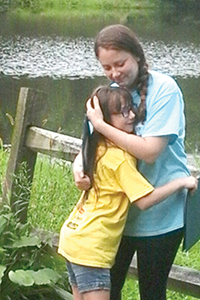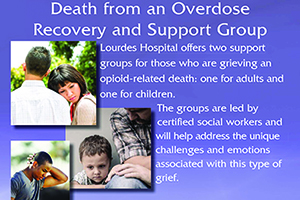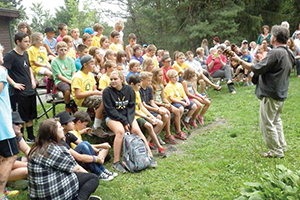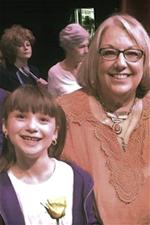By DALE SINGER
When parents outlive an adult child, the natural order of things gets upended. When the death is caused by an opioid overdose, the loss can be complicated by feelings of guilt over not having had the power to prevent it and chagrin over society's harsh judgment of addicts. With overdose now the leading cause of death in the U.S. in people under age 50, the number of stunned survivors continues to rise.

Isabella, a child whose mother died of an overdose, was helped at Camp Hope. Here, she hugs camp counselor Jennifer Mc Cormick at the camp in 2016. The camp is an offering of Lourdes Hospice of Vestal, N.Y.
That's been the case in Broome County, on the southern border of New York. Marie Halecki, a clinical social worker, leads bereavement groups there at the Lourdes Hospice Sister Fredrica Dunn Center for Grief and Loss in Vestal, N.Y. Lourdes Hospice support groups are open to all, not just those whose loved ones have been patients. The hospice is part of Our Lady of Lourdes Memorial Hospital in nearby Binghamton, N.Y. Two years ago, Lourdes Hospice began Death from Overdose Recovery and Support, a support group specifically for adults who have lost a loved one to overdose. It meets once a week for six weeks. New sessions start quarterly and are limited to 10 participants, so there is opportunity for everyone to speak. "It is almost always parents, maybe a few spouses and siblings" who participate, Halecki says.
Halecki recently added a curriculum for children aged 6 to 14 who have lost a relative to overdose. "We have not had anyone sign their children up for it yet. When we do, it will be once a quarter and I wrote the curriculum so it can be adjusted for ages 6 to14," she says.
The adult program is based on the standard curriculum used in the center's bereavement groups, and it was a component of that approach that clued Halecki in to the special circumstances faced by those who've lost a loved one to overdose. In the first meeting of each session, Halecki asks participants to name the person they lost and talk about the circumstances including when and how the death occurred. Had they been caregivers?
Not everyone was forthcoming about the cause of death. "There is a stigma and a shame to (an overdose death) for people who have experienced that, and they don't feel comfortable in a group," Halecki explains.
She recalls one parent who told the group their child had died in a car accident. Halecki found out later the cause of death was an overdose. In part because of the societal stigma of an overdose death, it generally takes longer for people who have lost a loved one to heroin to seek out a grief support group, she says. "I don't get people right after the loss, it's different than a natural death." When a participant was candid about an overdose being the cause of death, others in the regular grief groups treated them differently. As a result, several people who were grieving a family member lost to heroin dropped out of bereavement groups, Halecki says.

A poster advertises the specialized support groups for adults and children who have lost a loved one to a drug overdose.
Lifting the veil of silence
"We decided to do something completely different for people who lost someone to drug overdose," Halecki says. Participants in the overdose recovery support group draw support and empathy from each other as they share details of the chaos of addiction including when the drug use started, how it spiraled, how they drained their bank accounts paying for detoxification and rehabilitation programs, the calls from jail, and ultimately their despair at being unable to stop the death spiral of addiction.
"Many of these people were suffering alone," before the advent of overdose recovery support groups, Halecki says. "They don't get the condolences that people get when their loved one dies of cancer or in a car accident."
They have in common a longing to have their loved one remembered as a human being with inherent dignity. "They're not always seen that way after they died, because of what they died from," Halecki says. "But nobody comes into this world planning to get hooked on heroin and dying of it."
There can be lingering denial and an acute focus on the actual cause of death in the overdose recovery support group, Halecki says. "If they find out from the toxicology report that fentanyl (a synthetic opioid) was in the heroin, they say their loved one didn't really die of heroin. It almost gives them some consolation that this was not a typical heroin overdose. I know that sounds strange." Her role is not to challenge that belief system; still she offers some practical information on addiction to the group. Halecki says many people in the support group have other children who are using heroin, and she responds to their questions about the practicalities involved in keeping the overdose antidote Narcan on hand.
|
Children whose parents died because of opioid overdose find solace at hospice's camp
Many in the Death from Overdose Recovery and Support group are raising grandchildren who have lost a parent to overdose, and some of those children attend Camp Hope, a three-day grief camp offered by Lourdes Hospice each summer.

Youth attending Camp Hope in 2016 enjoy a musical performance at the camp, held last year at Camp Sertoma in Kirkwood, N.Y.
The 2017 session in late August drew 50 children between the ages of 6 and 14. Marie Halecki, the leader of the specialized bereavement group, says in the past two years more campers have lost a parent to overdose than to cancer. This year 1 out of 4 campers had a parent or loved one die because of overdose, 1 out of 5 were suicide survivors.
Debra Sepanj sent her 9-year-old granddaughter Isabella to the camp for the second year in a row. Isabella was 7 when her mother Nicole was found dead in August 2015, at the age of 35, in a suburb of St. Louis. Sepanj says Camp Hope has been a big help for both grandmother and granddaughter.
Sepanj says Nicole started using prescription opioids in her early 20s to manage pain following surgery. Her use escalated to addiction. Multiple attempts at rehabilitation failed. "I spent 15 years trying to keep her alive," Sepanj says. "I never got to hold her when she died. When she died, no one held her. She was alone."
From shy child to intrepid survivor
Isabella was shy when she started camp, Sepanj says, but that eased when she joined a camp theater group, acting in plays including Willy Wonka and The Lion King.
"Lion King is a wonderful play for children who lost their parents," Sepanj says. "Simba lost his dad, and he blames himself. A lot of children who lose their parents to overdose blame themselves, because they don't understand why their mommies and daddies die."
Camp Hope helps relieve such feelings, she adds.
"I was so impressed by the counselors. They each got it. It's beautiful. It's about life. We're all a part of life. You lost a parent. You lost the person who brought you into this world, and you're still learning, you're still growing."

Isabella and her grandmother, Debra Sepanj
Finding acceptance
Halecki says the campers are not segregated based on the cause of their loved ones' deaths. "Children want to fit in," Halecki says. "When you lose a parent or a caregiver, you don't feel like other children." At camp, though, children are encouraged to open up about those feelings in twice daily "healing circles." Other campers affirm the depths of that loss; that counteracts the feeling of otherness.
There is plenty of levity too. "We don't talk about death all day; we have a lot of fun as well," Halecki says.
Sepanj says that when Isabella hears other children say her mother was a junkie, her camp experience helps her cope. "She knows her mother was an addict," Sepanj says. "She knows how her mother died. She says, 'My mommy was a kind and loving person, but she had mental illness, and she took drugs, and she died of an overdose. She wanted to live, but she just couldn't do it.'
"She wanted people to know her mommy was good. This is what people need to understand. These children need to love their parents, and move on. Camp Hope does that," Sepanj says.
"Isabella has gone through this with such grace and dignity, as a child, like I've never seen," Sepanj says. "She is so understanding, more so than I've ever seen in an adult. I can't even explain it to you."
|
|
Opioid overdose deaths on the rise
More than 33,000 people died nationwide in 2015 from overdoses involving opioids — including prescription medications and heroin as well as fentanyl, a powerful synthetic drug that often is produced legally and illicitly, according to the Centers for Disease Control and Prevention.
Addiction, a chronic brain disease, is behind the epidemic of deaths. Even close brushes with death do not deter some users from feeding their opioid cravings.
"At some point, (drug use) stops being a choice," says Raymond Serowik, the emergency medical services coordinator for Broome County, N.Y., where Lourdes Hospice and Our Lady of Lourdes Memorial Hospital are located. He has seen addicts and their families struggle for years; in some cases, his office has made multiple emergency calls to the same address to resuscitate the same individual in a single day.
Deborah Blakeney, an assistant vice president at Our Lady of Lourdes Memorial Hospital in Binghamton, N.Y., directs bereavement programs at the Lourdes Hospice Sister Fredrica Dunn Center for Grief and Loss in Vestal, N.Y. "Resources to manage addiction are limited throughout the country, including in our area," she says. It's a challenge to reach and engage the people" who need help in addressing addiction.
Societal stigmatization of people who use illicit drugs or abuse prescription drugs is another barrier to care, and it reaches into health care facilities. "We're trying to make our staff and our community realize this needs to be looked at as an illness," Blakeney says.
As manager of substance abuse prevention programing for the hospital, Jill Alford-Hammitt oversees efforts to educate hospital staff about addiction, and she leads addiction education outreach efforts throughout Broome County. Her staff has conducted grand rounds on opioid addiction and hosted learning lunches for hospital employees to reinforce that addiction is a disease that can lay anybody low. Risk for addiction is not related to socioeconomic class, ethnicity or moral anchoring, Alford-Hammitt says, adding, "There are genetic factors that can put people more at risk for addiction."
The Lourdes student assistance program and alcohol and drug education prevention teams go into middle schools, high schools and churches to talk to adults and youth alike.
Last fall, the substance abuse prevention team conducted several sports injury forums for young athletes and their parents to alert them to the risks of using opioids for pain control. Because of the biology of the maturing brain, adolescents are at a high risk for addiction, Alford-Hammitt says. Athletes who rely on opioid pain killers to stay in the game are vulnerable to becoming physically and emotional dependent, and may do so more quickly than an adult.
She says parents have told her that their child got a 30-day supply of opioid-based Percocet or Vicodin for dental pain following molar extraction. That kind of sustained use can set the stage for addiction, Alford-Hammitt says, particularly if a young person begins to rely on the drug as a salve to emotional upset or social awkwardness.
The forums promoted alternatives to opioids to manage pain from sports injuries. A panel that included a doctor of osteopathic medicine, a chiropractor, a physical therapist and athletic trainer talked about the importance of body conditioning, strength training and stretching to prevent injury. And panelists suggested physical therapy, chiropractic manipulation and taping injured body parts during sports as alternatives to narcotic pain relief.
Lourdes distributed wallet cards with questions for parents to ask physicians recommending opioid analgesics for their children. The questions include "Why do I need to put my child on an opioid? And, is there some other method of treatment?" she says.
The Lourdes substance abuse prevention team hopes to present a community forum on pain management alternatives for young athletes this fall, Alford-Hammitt says.
Schools invited Lourdes to bring their drug education on site, and Alford-Hammitt engaged two recovering addicts, including a former school athlete, to talk to students during the last school year.
The Lourdes substance abuse program uses some of its grant funding to place addiction counselors in county high schools. A part-time counselor visits middle schools. Teachers and administrators who suspect a child may be abusing drugs, or at risk of doing so, make referrals to the counselors. The counselors work with individual students on building emotional resilience and healthy coping mechanisms, Alford-Hammitt says.
— DALE SINGER
|
Copyright © 2017 by the Catholic Health Association
of the United States
For reprint permission, contact Betty Crosby or call (314) 253-3490.